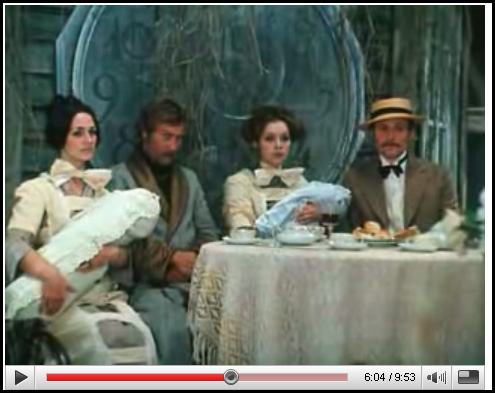I haven’t found any good obituaries in U.S. newspapers for Nonna Mordukova, who died earlier this month. The one in the Washington Post pointed out that she appeared in some government propaganda films: “Throughout a career that spanned half a century, Ms. Mordyukova appeared in dozens of films, including some textbook examples of Soviet propaganda.”
Well, everyone knows that there were a lot of Soviet propaganda films. But what was surprising to me when I started watching Russian movies was the parts that were subversive of Soviet propaganda, including three roles I can think of that were played by Nonna Mordyukova. If the Post wanted to talk about the political aspects of her work, it should have made that point. These are in three films that are readily available to U.S. viewers via Netflix.
In Vokzal dlya Dvoikh she played the part of an “uncle” who gave an entertaining little lecture on the virtues of private property and free enterprise. I’ve never seen anything like that in a popular U.S. film. In Brilliantovaya Ruka she played the part of a meddlesome building superintendent — in a way that provided social commentary which I suspect was not comforting to all the authorities. And the biggest role was of course as the Commissar in Komissar — a film that was suppressed for 20 years and which even under glasnost was released with extreme reluctance, seeing the light of day only thanks to outside pressure. In an interview, the director Alexandr Askoldov pointed out that even today it is rarely seen in Russia. Nonna Mordukova was one of the actors who interceded on his behalf at the time when the film was suppressed, when Askoldev was facing the possibility of a fate worse than that of being kicked out of the Party and of being prohibited from directing more films (which is what did happen to him).
It’s not that Mordyukova was a political dissident. As far as I know she wasn’t anything of the kind. She even seems to have preferred that Askoldov give in to the censors on the parts of the film that he refused to edit out. (You can see this on the Komissar DVD that contains “extra” material.) But she played a role in conflicts that we would do well to know about.
Here is a page about Mordyukova that gives better information about her work:
Komissar is an interesting case. Most web pages that talk about her work mention her big role in Komissar. But I have found Russian sites that tell about her career without mentioning that film. Same for Rolan Bykov, who played the male lead (see clip below). There are Russian web sites that tell all about his work, except for their silence about that movie.
And now I’ve learned that Komissar is still censored, even at Netflix. The clip below includes several minutes that were not on the one we got from Netflix. I am suspicious of why they were removed, because it seems they are important in leading up to the famous Holocaust scene that got Askoldov in such big trouble. Maybe the producers didn’t want to touch the Turkey-Armenia genocide issue, which is mentioned in this clip. But there are also parts that seem important in developing the character played by Mordyukova — in which she explains some of her views on war service and the political aspects of the wars.

25-Jul Slight edits to remove awarkdness, I hope

